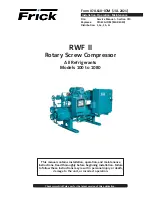
SECTION 1
6
swallowed, induce vomiting by administering a
tablespoon of salt, in each glass of clean, warm
water until vomit is clear, then administer two
teaspoons of baking soda in a glass of clean
water. Have patient lay down and cover eyes to
exclude light. Call a physician immediately.
1.8
ELECTRICAL SHOCK
A.
This compressor should be installed and main-
tained in full compliance with all applicable Fed-
eral, State and Local codes, standards and
regulations, including those of the National Elec-
trical Code, and also including those relative to
equipment grounding conductors, and only by
personnel that are trained, qualified and dele-
gated to do so.
B.
Keep all parts of the body and any hand-held
tools or other conductive objects away from
exposed live parts of electrical system. Maintain
dry footing, stand on insulating surfaces and
DO
NOT
contact any other portion of the compressor
when making adjustments or repairs to exposed
live parts of the electrical system. Make all such
adjustments or repairs with one hand only, so as
to minimize the possibility of creating a current
path through the heart.
C.
Attempt repairs in clean, dry and well lighted and
ventilated areas only.
D. DO NOT
leave the compressor unattended with
open electrical enclosures. If necessary to do so,
then disconnect, lock out and tag all power at
source so others will not inadvertently restore
power.
E.
Disconnect, lock out, and tag all power at source
prior to attempting repairs or adjustments to
rotating machinery and prior to handling any
ungrounded conductors.
1.9
LIFTING
A.
If the compressor is provided with a lifting bail,
then lift by the bail provided. If no bail is provided,
then lift by sling. Compressors to be air-lifted by
helicopter must not be supported by the lifting
bail but by slings instead. In any event, lift and/or
handle only in full compliance with OSHA stan-
dards 29 CFR 1910 subpart N and/or any appli-
cable Federal, State, and Local codes, standards
and regulations.
B.
Inspect points of attachment for cracked welds
and for cracked, bent, corroded or otherwise
degraded members and for loose bolts or nuts
prior to lifting.
C.
Make sure entire lifting, rigging and supporting
structure has been inspected, is in good condi-
tion and has a rated capacity of at least the
weight of the compressor. If you are unsure of
the weight, then weigh compressor before lifting.
D.
Make sure lifting hook has a functional safety
latch or equivalent, and is fully engaged and
latched on the bail or slings.
E.
Use guide ropes or equivalent to prevent twisting
or swinging of the compressor once it has been
lifted clear of the ground.
F. DO NOT
attempt to lift in high winds.
G.
Keep all personnel out from under and away
from the compressor whenever it is suspended.
H.
Lift compressor no higher than necessary.
DANGER
All field equipment must be tested for elec-
trostatic fields prior to servicing or making
contact with the machine using the follow-
ing or equivalent test equipment:
• 90-600 VAC: Volt detector such as
Fluke Model 1AC-A
• 600-7000 VAC: Voltage detector
such as Fluke Networks Model
C9970
It is the responsibility of each organization
to provide/arrange training for all their
associates expected to test for electrostatic
fields.
Содержание ShopTek ST1100
Страница 10: ...NOTES 8...
Страница 22: ...NOTES 20 02250180 090 R00...
Страница 39: ...NOTES 37 02250180 090 R00...
Страница 48: ...S HOP T EK USER MANUAL SECTION 3 46 02250180 090 R00 Figure 3 14 Wiring Diagram SRS 25 100 115 230V 1 60...
Страница 49: ...SECTION 3 S HOP T EK USER MANUAL 47 02250180 090 R00 Figure 3 15 Wiring Diagram SRS 9 18 220 240V 1 50...
Страница 50: ...S HOP T EK USER MANUAL SECTION 3 48 02250180 090 R00 Figure 3 16 Wiring Diagram SRS 24 30 220 240V 1 50...
Страница 58: ...NOTES 56 02250180 090 R00...
Страница 71: ...NOTES 69...









































